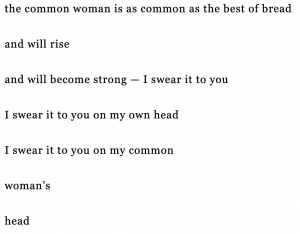As the final poem in this collection, “Vera” represents one of a number of Grahn’s “common women,” giving us an example in poetry of the numerous problems working class women faced. The poem stands as an ode to honor Vera’s story, and serves to help the women who follow. The poem begins with the speaker talking directly to Vera, “Solemnly swearing / to swear as an oath to you… as if an oath could be wrapped around / your shoulders / like a new coat” (lines 1-5). This oath to Vera is to make sure her story is told. The comparison of this oath to a “new coat” “wrapped around [her] shoulders” suggests the warmth and connection developed as the speaker shares Vera’s story. The speaker stands in solidarity with her and the experiences she endured as a working class woman. After swearing an oath, the speaker goes on to tell Vera’s story, “for your 28 dollars a week and the bastard boss / you never let yourself hate” (lines 6-7). Vera was a woman who worked for low pay and faced harassment in the workplace. She could not let herself hate her boss because she needed this job. Standing up for herself would just leave her jobless, unable to support herself, an enormous problem millions of women faced at this time. And while Vera worked all day for low wages, dealt with awful bosses, she must come home and face “all the work you did at home / where you never got paid” (lines 8-9). She also dealt with tragedy, watching her husband drink himself to death, as the speaker states Vera was “watching the hard liquor break your fine husband down / into a dead joke” (lines 12-13). The death of her husband leaves Vera on her own, left to try and make enough money to support herself and her children without a living wage.

Lines 26-32 of “VII. Vera, from my childhood” found in The Work of a Common Woman
This first half of the poem describes the insurmountable struggles Vera faced as a “common woman”. It is through this ode to Vera’s adversity that Grahn empowers the women who come after Vera. As we know from the title of the poem, this woman is from the speaker’s childhood and cannot be saved. The speaker retells this story to save the women who will come after Vera, however. Grahn returns to the repetition found at the end of each of her previous six poems in this collection, and drives this repetition home using it numerous times in the final lines. The poem reads, “the common woman is as common / as good bread / as common as when you couldn’t go on / but did” (lines 20-23). The common woman is compared to bread, the sustenance of life. While Grahn emphasizes her importance, she further commends the ability of the common woman to endure adversity and continue moving forward. As the poem wraps up, the final lines become an anthem for the feminist movement, “the common woman is as common as the best of bread / and will rise / and will become strong—I swear it to you” (lines 26-28). These lines were instrumental in pushing the women’s movement forward; often recited at rallies, meetings, on the radio, and in bookstores across the country.
Grahn puts the struggles of common women into poetry that can be passed on from woman to woman to help them “rise” and “become strong”.
Grahn, Judy. “VII. Vera, from my childhood,” The Work of a Common Woman: the Collected Poetry of Judy Grahn 1964-1977. Crossing Press, 1980. (73).
